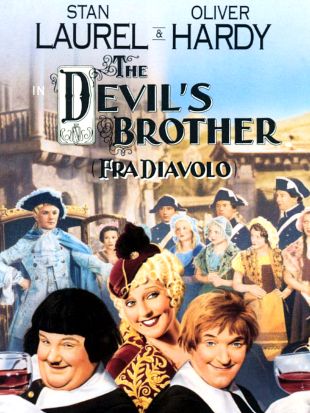
The most successful, and arguably best, of Laurel & Hardy's comic operas, The Devil's Brother firmly established that the team could be as funny in a feature film as they had for years in short subjects. Producer Hal Roach, who handled the main direction chores himself, had chosen an obscure 1830 opera by Daniel F. Auber about an Italian highwayman, Fra Diavolo, who masquerades as a foppish marquis in order to take from the rich and give to himself. What interested Roach was obviously the fact that the opera contained two comic supporting characters perfectly suited for the reigning comedy team of Stan Laurel and Oliver Hardy. They play Stanlio and Ollio, a couple of wanderers robbed of their life savings by one of the area's multitudinous highwaymen. In perhaps his most lucid moment, Stanlio suggests that they should recuperate their losses by becoming robbers themselves but, unfortunately, their first victim proves to be none other than the notorious Fra Diavolo (Dennis King), whose signature song "On Yonder Rock Reclining" sends shivers up the spine of all decent folks. After a failed attempt to hang the overfed Ollio, Fra makes the pair his personal servants. The remainder of the film depicts how Diavolo, as the Marquis, succeeds in robbing wayward noblewoman Lady Pamela (Thelma Todd) of 500,000 francs, cunningly sewn into her petticoats, despite the dubious assistance of Stanlio and Ollio. With all these shenanigans taking center stage, the opera's dull ingenues, inn-keeper's daughter Zerlina Lucile Browne and Captain Lorenzo (Arthur Pierson), can only watch, numbly one would expect, from the sidelines. After hiring Broadway baritone Dennis King to play the romantic hero, Roach hedged his bets by casting slapstick regulars James Finlayson and Thelma Todd as the warbling highwayman's main targets, thus assuring that the opera's trite libretto would never risk being taken serious. King was neither better nor worse than the average screen baritone but Miss Todd, especially, shined as the flirtatious Lady Pamela, one of this ultimately tragic comedienne's most vivid performances. In the end, of course, The Devil's Brother belongs squarely to Laurel & Hardy, the former memorably driving his partner (and everybody else) crazy with the frustrating dexterity of his "kneesy, easy, nosey" routine. Released to thunderous ovations in Europe as Fra Diavolo, The Devil's Brother has been reissued to television as both Bogus Bandits and The Virtuous Tramps.
